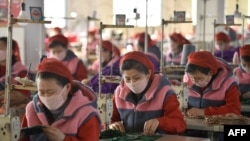North Korea continues to insist there are no coronavirus infections within its borders, even as the impoverished country appeals to international aid organizations for help in preventing an outbreak of the disease.
There has been “no single confirmed case” of the coronavirus, according to a North Korean public health official quoted in the Rodong Sinmun, the official paper of North Korea’s ruling Workers’ Party, on Tuesday.
The North Korean official said nationwide preventative measures, including a strict quarantine system, have successfully blocked the virus, according to South Korea’s Yonhap news agency.
The virus, which causes a pneumonia-like illness that was recently named COVID-19, has killed nearly 2,000 people and infected over 73,000. Almost all the infections have been in China-North Korea’s next-door neighbor.
A coronavirus outbreak could quickly turn into a humanitarian disaster in North Korea, parts of which are impoverished. The country does not have the infrastructure or medical supplies necessary to adequately combat the virus, experts warn.
After the virus emerged last month in central China, North Korea took quick steps to seal its borders. But doing so would be difficult in part because North Korea relies on both formal and informal trade with China. Several unconfirmed reports suggest the virus has already reached the country.
North Korea, which has called the virus prevention efforts a matter of “national survival,” has asked some international relief groups for help.
A spokesperson for Doctors Without Borders told VOA it received an official request from North Korean authorities in early February “to strengthen the national capacity to prepare for a potential outbreak of COVID-19.”
“We are now planning and preparing donations of medical supplies. According to officials, no cases have been reported - either confirmed or suspected,” the spokesperson added.
Last week, the International Federation of Red Cross and Red Crescent National Societies told VOA’s Korea Service that it has mobilized 500 volunteers in four provinces close to the Chinese border. The volunteers are supporting screening efforts and promoting hygiene practices, the group said.
“Red Cross volunteers are coordinating with local health staff and government departments to engage with communities and visit households who live remotely and are not easily reached, to ensure everyone receives this support. Red Cross has also sent volunteers on bikes to these remote areas to share coronavirus awareness messages,” said Xavier Castellanos, the group's Asia Pacific Regional Director.
The World Health Organization, which is also providing medical supplies to North Korea, told VOA last week it has not received any reports of coronavirus cases. Citing figures from North Korea’s Ministry of Public Health, the WHO said 141 travelers entering North Korea have tested negative for the virus, after showing signs of fever.
“The Democratic People’s Republic of Korea has the capacity to carry out these tests as they have PCR machines, and their laboratory technicians and experts were trained by WHO in influenza testing in a Hong Kong laboratory last year,” said Dr. Edwin Ceniza Salvador, the WHO Representative to North Korea.
The U.S. State Department said Thursday it is "deeply concerned" about North Koreans' vulnerability to the virus and is prepared to “expeditiously facilitate” efforts by international aid groups to provide help.
North Korea is under international sanctions because of its nuclear weapons program. The sanctions prohibit a wide range of cooperation with the North, meaning aid groups wanting to help must first obtain exemptions.
The U.N. committee that handles those exemptions told VOA’s Korean Service last week that it will consider those requests "as expeditiously as possible."




